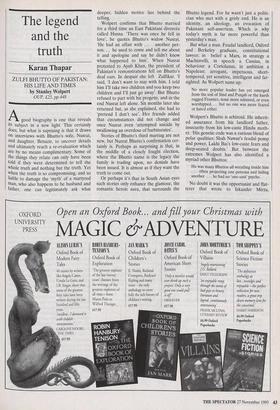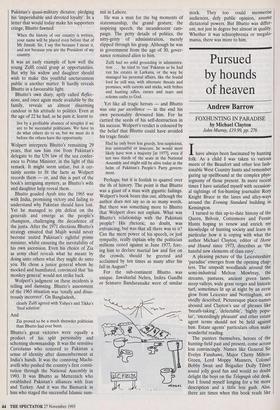The legend and the truth
Karan Thapar
ZULFI BHUTTO OF PAKISTAN: HIS LIFE AND TIMES by Stanley Wolpert OUP, £25, pp.448 Agood biography is one that reveals its subject in a new light This certainly does, but what is suprising is that it draws on interviews with Bhutto's wife, Nusrat, and daughter, Benazir, to uncover details and ultimately reach a re-evaluation which are by no means complimentary. Some of the things they relate can only have been told if they were determined to tell the whole truth and nothing but the truth. Yet when the truth is so compromising, and so liable to damage the 'myth' of a martyred man, who also happens to be husband and father, one can legitimately ask what
deeper, hidden motive lies behind the telling.
Wolpert confirms that Bhutto married for a third time an East Pakistani divorcée called Husna. 'There was once he fell in love', he quotes Bhutto's widow Nusrat. `He had an affair with ... another per- son... he used to come and tell me about it and apologise and say he didn't know what happened to him'. When Nusrat protested to Ayub Khan, the president of Pakistan's remonstrations fell on Bhutto's deaf ears. In despair she left Zulfikar. 'I said, 'I don't want to stay with him. I told him I'll take two children and you keep two children and I'll just go away'. But Bhutto refused to part with his progeny, and in the end Nusrat left alone. Six months later she returned but, as she explained, she had to `pretend I don't see'. Her friends added that circumstances did not change and once Nusrat even 'attempted suicide by swallowing an overdose of barbiturates'.
Stories of Bhutto's third marriag are not new, but Nusrat Bhutto's confirmation cer- tainly is. Perhaps as surprising is that, in the middle of a closely fought election, where the Bhutto name is the legacy the family is trading upon, no denials have been issued. It is almost as if they want the truth to come out.
Or perhaps it's that in South Asian eyes such stories only enhance the glamour, the romantic heroic aura, that surrounds the Bhutto legend. For he wasn't just a politi- cian who met with a grisly end. He is an identity, an ideology, an evocation of Pakistani self-assertion. Which is why today's myth is far more powerful than yesterday's man.
But what a man. Feudal landlord, Oxford and Berkeley graduate, constitutional lawyer; in belief a Marx, in strategy a Machiavelli, in speech a Cassius, in behaviour a Coriolanus, in ambition a Napolean; arrogant, impetuous, short- tempered, yet sensitive, intelligent and far- sighted. As Wolpert sums up: No more popular leader has yet emerged from the soil of Sind and Punjab or the harsh rugged Frontier, none more admired, or even worshipped. . . but no one was more feared or hated either.
Wolpert's Bhutto is schizoid. He inherit- ed assurance from his landlord father, insecurity from his low-caste Hindu moth- er. 'His genetic code was a curious blend of polar qualities: Shah Nawaz's feudal pomp and power, Lakhi Bai's low-caste fears and deep-seated doubts.' But between the extremes Wolpert has also identified a myriad other Bhuttos: He was many Bhuttos all wrestling inside him . . . often projecting one persona and hiding another . .. he had no 'one-unit' psyche.
No doubt it was the opportunist and flat- terer that wrote to Iskander Mirza, Pakistan's quasi-military dictator, pledging his 'imperishable and devoted loyalty'. In a letter that would today make his supporters cringe, Bhutto fawned: When the history of our country is written, your name will be placed even before that of Mr Jinnah. Sir, I say this because I mean it, and not because you are the President of my country.
It was an early example of how well the young Zulfi could grasp at opportunities. But why his widow and daughter should wish to make this youthful unctuousness public is another matter. It hardly reveals Bhutto in a favourable light.
Bhutto's own diary, aptly called Reflec- tions, and once again made available by the family, reveals an almost disarming candour in his attitude to politics. Even at the age of 22 he had, as he puts it, learnt to
live by a profitable absence of scruples if we are to be successful politicians. We have to do what others do to us, but we must do it before the others have the opportunity.
Wolpert interprets Bhutto's remaining 29 years, that saw him rise from Pakistan's delegate to the UN law of the sea confer- ence to Prime Minister, in the light of this remark. It might seem unfair, but it cer- tainly seems to fit the facts as Wolpert records them — or, and this is part of the book's intriguing mystery, as Bhutto's wife and daughter help reveal them.
Bhutto goaded Ayub into the 1965 war with India, promising victory and failing to understand why Pakistan should have lost. Yet he managed to pin defeat on the generals and emerge as the people's champion, challenging the decadence of the junta. After the 1971 elections Bhutto's strategy ensured that Mujib would never become united Pakistan's rightful prime minister, whilst ensuring the inevitability of his own ascension. Even his choice of Zia as army chief reveals what he meant by doing unto others what they might do unto you. He chose a junior general whom he mocked and humiliated, convinced that `his monkey general' would not strike back.
Wolpert's judgment on these incidents is telling and damning. Bhutto's assessment of the 1965 situation was 'totally and disas- trously incorrect'. On Bangladesh, clearly Zulfi agreed with Yahya's and Tikka's `final solution'.
And Zia proved to be a much shrewder politician than Bhutto had ever been.
Bhutto's great victories were equally a product of his split personality and scheming showmanship. It was the sensitive Coriolanus who restored to Pakistan a sense of identity after dismemberment at India's hands. It was the conniving Machi- avelli who pushed the country's first consti- tution through the National Assembly in 1993. It was Bhutto as Metternich who established Pakistan's alliances with Iran and Turkey. And it was the Bismarck in him who staged the successful Islamic sum- mit in Lahore.
He was a man for the big moments of statesmanship, the grand gesture, the inspiring speech, the incandescent cam- paign. The petty details of politics, the nitty-gritty of administration, merely slipped through his grasp. Although he was in government from the age of 30, gover- nance remained alien to him.
Zulfi had no solid grounding in administra- tion . . he tried to 'run' Pakistan as he had run his estates in Larkana, or the way he managed his personal affairs, like the feudal lord he still was, with alternate threats and promises, with carrots and sticks, with bribes and hunting rifles, curses and tears and solemn oaths to God.
Yet like all tragic heroes — and Bhutto was one par excellence — in the end his own personality devoured him. For he carried the seeds of his self-destruction in his success. Wolpert's verdict is coloured by the belief that Bhutto could have avoided his tragic finale:
Had he only been less greedy, less suspicious, less mistrustful or insecure, he would most likely have won a majority [in 1977], even if not two thirds of the seats in the National Assembly and might still be alive today at the helm of Pakistan's People's Party .govern- ment.
Perhaps; but it is foolish to quarrel over the ifs of history. The point is that Bhutto was a giant of a man with gigantic failings. Wolpert's book bears this out, although the author does not say so in so many words. But there was something more to Bhutto that Wolpert does not explain. What was Bhutto's relationship with the Pakistani people? His rhetoric, no doubt, was entrancing, but was that all there was to it? Can the mere power of his speech, or just sympathy, really explain why the politician millions rioted against in June 1977, forc- ing him to declare martial law and fire on the crowds, should be greeted and acclaimed by ten times as many after his fall in August?
For the sub-continent Bhutto was unique. Jawaharlal Nehru, Indira Gandhi or Srimavo Bandaranaike were of similar stock. They too could mesmerise audiences, defy public opinion, assume dictatorial powers. But Bhutto was differ- ent, not just in degree but almost in quality. Whether it was schizophrenia or megalo- mania, there was more to him.











































































 Previous page
Previous page